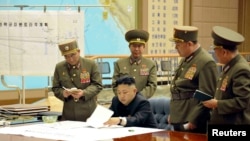North Korea says it has entered what it calls a "state of war" against its southern neighbor.
In a statement carried by the North's official Korean Central News Agency [KCNA] on Saturday, Pyongyang said "all issues raised between the North and the South will be handled accordingly."
North Korea has been threatening to attack the South and U.S. military bases almost on a daily basis since the beginning of March.
On Friday, tens of thousands of North Koreans held a huge rally in support their leader's threat of a possible military strike against the United States.
Soldiers, workers and students marched through Kim Il Sung square in Pyongyang. The North's leader, Kim Jong Un, was not present.
The rally came after Kim Jong Un ordered preparations for rocket strikes on the U.S. mainland and American military bases in South Korea, Guam and Hawaii.
The KCNA said the leader put his rocket units on standby Friday, after a emergency meeting with top army commanders. He said the "time has come to settle accounts" with the United States.
A South Korean military source later told VOA an increased movement of soldiers and vehicles had been detected at North Korean rocket sites.
Kim Jong Un's announcement Friday came after nuclear-capable U.S. B-2 stealth bombers flew over an island Thursday off the coast of the Korean peninsula. The maneuver was part of ongoing military drills with South Korea.
U.S. Defense Secretary Chuck Hagel linked the B-2 flights to recent North Korean provocations, which include threats of nuclear strikes on South Korea, and the U.S. and its Pacific allies.
In Moscow, Russian Foreign Minister Sergei Lavrov warned a buildup of tensions on the Korean peninsula could "spiral into a vicious cycle," and he urged all sides involved in the standoff to calm down.
Lavrov also said Russia is concerned about increased military activity around North Korea, an apparent reference to the U.S.-South Korean military drills.
Analysts say Pyongyang is not yet capable of mounting an operational nuclear warhead on a missile. But many of its neighbors are worried they may be easier targets for the North's conventional weapons.
In a statement carried by the North's official Korean Central News Agency [KCNA] on Saturday, Pyongyang said "all issues raised between the North and the South will be handled accordingly."
North Korea has been threatening to attack the South and U.S. military bases almost on a daily basis since the beginning of March.
On Friday, tens of thousands of North Koreans held a huge rally in support their leader's threat of a possible military strike against the United States.
Soldiers, workers and students marched through Kim Il Sung square in Pyongyang. The North's leader, Kim Jong Un, was not present.
The rally came after Kim Jong Un ordered preparations for rocket strikes on the U.S. mainland and American military bases in South Korea, Guam and Hawaii.
The KCNA said the leader put his rocket units on standby Friday, after a emergency meeting with top army commanders. He said the "time has come to settle accounts" with the United States.
A South Korean military source later told VOA an increased movement of soldiers and vehicles had been detected at North Korean rocket sites.
Kim Jong Un's announcement Friday came after nuclear-capable U.S. B-2 stealth bombers flew over an island Thursday off the coast of the Korean peninsula. The maneuver was part of ongoing military drills with South Korea.
U.S. Defense Secretary Chuck Hagel linked the B-2 flights to recent North Korean provocations, which include threats of nuclear strikes on South Korea, and the U.S. and its Pacific allies.
In Moscow, Russian Foreign Minister Sergei Lavrov warned a buildup of tensions on the Korean peninsula could "spiral into a vicious cycle," and he urged all sides involved in the standoff to calm down.
Lavrov also said Russia is concerned about increased military activity around North Korea, an apparent reference to the U.S.-South Korean military drills.
Analysts say Pyongyang is not yet capable of mounting an operational nuclear warhead on a missile. But many of its neighbors are worried they may be easier targets for the North's conventional weapons.






